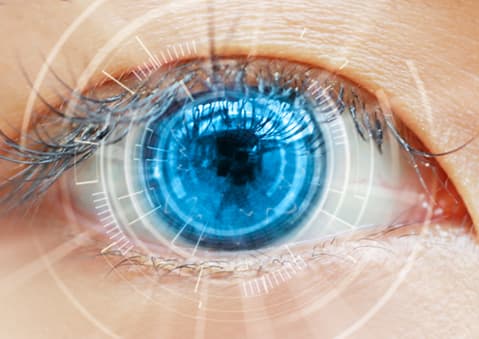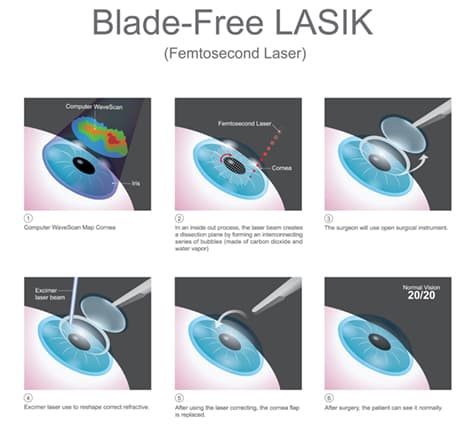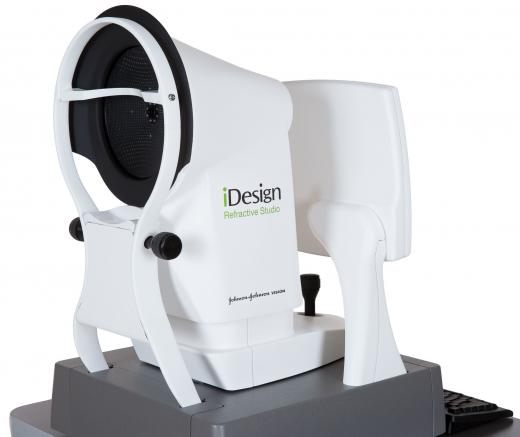 LASIK is a popular elective procedure that corrects nearsightedness, farsightedness and astigmatism. Most patients who undergo LASIK end up with 20/20 vision or better!
LASIK is a popular elective procedure that corrects nearsightedness, farsightedness and astigmatism. Most patients who undergo LASIK end up with 20/20 vision or better!
LASIK is one of the most popular elective surgeries in the country. It also comes with a 96% success rate for patients who have had it.
What Is LASIK?
LASIK is an acronym for laser in-situ keratomileusis. During LASIK, a laser corrects the eyesight by reshaping tissue under the cornea.
This allows light entering the eye to focus onto the retina, creating clearer vision. LASIK can correct nearsightedness, farsightedness, and astigmatism.
Who Is A Good Candidate For LASIK?
Although LASIK is a life-changing procedure, it’s not right for everyone. It is important to talk to your doctor about whether LASIK surgery is right for you.
LASIK surgery is generally done on adults, whose eyes are relatively healthy.
 Other factors that go into LASIK candidacy include:
Other factors that go into LASIK candidacy include:
- stable vision that hasn’t changed in at least a year
- not suffering from conditions like dry eye before undergoing LASIK
- not having cataracts, glaucoma, or diabetic retinopathy
- being able to heal normally and not having any autoimmune conditions
- not being currently pregnant or planning on becoming pregnant
- being at least 18 years old
- having thick enough corneas to safely undergo LASIK
There are other factors that go into LASIK candidacy, so make sure to discuss them with your eye doctor.
What Happens During A LASIK Consultation?
 If you think you may be a good candidate for LASIK eye surgery, you must schedule a LASIK consultation. During your evaluation, your doctor will talk about what to expect during and after LASIK.
If you think you may be a good candidate for LASIK eye surgery, you must schedule a LASIK consultation. During your evaluation, your doctor will talk about what to expect during and after LASIK.
Your medical history will be taken, and your eyes will need to be fully examined. After completing your consultation, your doctor will discuss if you’re a candidate. If you’re not, there are other vision correction options you may be better suited for.
What Happens When You Get LASIK?
LASIK surgery is an outpatient procedure performed in your doctor’s office.
Before the procedure, you will receive numbing drops and your eye will be kept in place with a suction ring. Once the surgery begins, your doctor will create a flap in the cornea of the eye.
There are no blades used during LASIK anymore. All reshaping of corneal tissue occurs using lasers. Using the computer-controlled laser, the doctor reshapes the cornea to improve your vision.
To correct nearsightedness, the doctor flattens the cornea. To correct farsightedness, the cornea gets made steeper.
For astigmatism, the doctor uses the excimer laser to smooth an irregular cornea. The reshaping of the cornea is often completed in less than a minute.
Once the corneal reshaping is over, the doctor repositions the flap. There are no stitches needed, since the flap reattaches on its own.
Customized LASIK Treatment with iDESIGN
Next Generation of Customized LASIK Treatment
The new iDESIGN Refractive Studio provides surgeons with the ability to deliver one-of-a-kind custom laser vision correction for each patient to have excellent visual outcomes following their LASIK procedure.
- Next generation LASIK platform that measures the eye inside and out to enable highly precise personalized vision correction
- Only available LASIK platform indicated for monovision LASIK in presbyopic myopic patients
Next Generation of Customized LASIK Treatment
The new iDESIGN Refractive Studio provides surgeons with the ability to deliver one-of-a-kind custom laser vision correction for each patient to have excellent visual outcomes following their LASIK procedure.
- Next generation LASIK platform that measures the eye inside and out to enable highly precise personalized vision correction
- Only available LASIK platform indicated for monovision LASIK in presbyopic myopic patients
- 25 times more precise than the traditional way of measuring refractive errors which rely on subjective input1
How Do I Know If Getting LASIK Is Right For Me?
 Before getting LASIK, it is important to schedule a consultation with your eye doctor. This is your opportunity to talk about the procedure and to determine if LASIK surgery is right for you.
Before getting LASIK, it is important to schedule a consultation with your eye doctor. This is your opportunity to talk about the procedure and to determine if LASIK surgery is right for you.
During your evaluation, you’ll go over your medical history. You’ll also receive a complete eye examination.
It is important to make sure your eyes are healthy before getting LASIK. Certain conditions may disqualify you from surgery, such as cataracts or glaucoma.
If you are a good candidate, your physician will explain the procedure to you. They’ll also go over what to expect during and after LASIK.
During your consultation, your eyes are also photographed and mapped. This is done with a corneal topopgrapher.
This will become the map your eye doctor uses during LASIK. It ensures the most precise procedure and successful results
How Long Does LASIK Take?
On the day of your surgery, you should expect to spend around an hour in the doctor’s office. You will need someone to drive you home because your vision will be blurry after LASIK.
You are not put under general anesthesia. Instead, you will receive numbing eye drops so you won’t feel any pain. During LASIK, you will sit in a reclining chair.
The eye doctor will position your head under the laser and uses a speculum to keep your eye open.
What’s Recovering After LASIK Like?
 Since numbing drops are used during the procedure, patients experience very little pain. The recuperation period from LASIK is not long.
Since numbing drops are used during the procedure, patients experience very little pain. The recuperation period from LASIK is not long.
Patients report a significant improvement in vision almost immediately after LASIK. This only continues to get better over time. While recovering after LASIK, you can get back to enjoying many of your normal activities.
You should avoid swimming for at least a month while your eyes continue healing. This includes swimming in lakes, pools, hot tubs, and the ocean.
Most patients feel well enough to go back to work a day or two after LASIK! This depends on the individual patient’s needs.
After undergoing LASIK surgery, most patients no longer need glasses or contacts. That improved vision ends up saving thousands of dollars a year. Getting LASIK can be good for your wallet as well!
Commonly Asked Questions About LASIK Surgery
What Does LASIK Stand For?
LASIK is an acronym for laser assisted in-situ keratomileusis. During LASIK, a laser corrects the eyesight. This is by reshaping tissue under the cornea, which is the round dome at the front of the eye.
This allows light entering the eye to focus onto the retina creating clearer vision.
Why Does Someone Get LASIK Surgery?
LASIK is a popular elective procedure that corrects nearsightedness, farsightedness and astigmatism. Most patients who get LASIK end up with 20/20 vision or better!
LASIK surgery is only FDA approved for adults who are 18 years of age or older. To undergo the procedure, you must schedule a LASIK consultation and be a good candidate.
Like any surgical procedure, not everyone can get LASIK. If you have conditions like glaucoma or cataracts, you may not be able to have LASIK. This is one reason why a LASIK consultation is important!
Are There Any Side Effects?
Side effects are often minor after LASIK but it may include dry eyes. If you suffer from dry eye after LASIK, you can treat it with lubricating eye drops.
This will disappear over time as you recover from the surgery. Some patients experience halos or starbursts around lights, which may occur at night.
These are also temporary and disappear over time. Your eye doctor will want you to return for a follow-up visit within a day of the surgery. You’ll also need to return after a week and a month to chart your progress.
In very rare cases, patients will report a worsening of their vision after getting LASIK. In those cases, consult with your eye doctor to find the cause and determine the next course of treatment.
Will I Still Need Glasses After LASIK?
LASIK remains one of the most popular elective medical procedures in this country! Most patients report satisfaction with their vision results.
Nearly all who undergo LASIK end up with 20/20 vision and a smaller number end up with vision that is better than 20/20. Some may need glasses for certain activities after LASIK, like driving at night.
What Happens During LASIK?
Before the procedure begins, you’ll receive anesthetic numbing eye drops. These prevent you feeling any pain during LASIK!
After the numbing eye drops kick in, it’s time for the procedure to begin. It starts with your LASIK surgeon creating a flap in the cornea with the use of a femtosecond laser. Then the corneal tissue gets reshaped with a laser.
Using the computer-controlled laser, the doctor reshapes the cornea to improve your vision. To correct nearsightedness, the doctor flattens the cornea.
To correct farsightedness, the cornea is made steeper. For patients with astigmatism, the doctor uses the excimer laser. This smooths an irregular cornea into a normal shape.
The reshaping of the cornea is often completed in less than a minute. Once the corneal reshaping is completed, the doctor repositions the flap.
This adheres to the patient’s eye naturally and doesn’t need stitches!
What Is The Recovery Like?
After the surgery, most patients report improved vision right away. This improvement in vision will continue in the weeks following the surgery. Patients may resume driving as soon as they can see well enough to drive but cannot drive on the day of surgery. Many people also return to work the day after LASIK.
Doctors often recommend a patient take 2-3 days off to rest afterwards. Some people experience dry eyes, which can be treated with artificial tears and drops.
Another side effect can be experiencing halos or sunbursts around lights. This may occur most often at night, but it also disappears over time.
Patients do report improved vision immediately after surgery. Most go on to have 20/20 vision afterwards, if not better!
How Do I Know If LASIK Is Right For Me?
The first step towards LASIK is having a consultation with your eye physician. It’s important to talk about the procedure to determine if LASIK surgery is right for you.
You will need a complete eye examination and to discuss your medical history in full. If you are a good candidate, your physician will explain the procedure to you.
They will also go over what to expect before, during, and after surgery. If you decide to move forward with LASIK, your eyes will be photographed.
They are also electronically mapped with a machine called a corneal topographer. This will become the map your eye doctor will use during the surgery. It ensures the most precise procedure and successful results afterwards.
How Risky Is LASIK?
An estimated 10 million Americans have had LASIK surgery since 1999. It remains one of the most popular elective surgeries in the country.
LASIK has a 96% satisfaction rate with patients who have had it! As small as 1 percent of patients experience worsened vision instead of improvement.
You should only have LASIK if it’s performed by a board-certified ophthalmologist. All physicians at Huffman & Huffman, P.S.C. are board-certified.
How Much Does It Cost?
At Huffman and Huffman, we accept both private insurance and authorized Medicare benefits. Our billing/financial team will work with you before LASIK.
Is LASIK is an elective procedure, most insurance plans will not cover the procedure. We offer payment plans and will set up a plan for monthly payments based on your circumstances.
Please contact our billing department to get your billing and payment plans set up for LASIK. We also accept CareCredit and can help you apply for it.
CareCredit is a healthcare financing credit card, perfect for elective procedures like LASIK!
LASIK Surgery in Lexington, Kentucky
At Huffman & Huffman P.S.C., our doctors are experienced surgeons who are board-certified. We are only trained in the latest technology.
We have successfully performed hundreds of LASIK procedures with proven success. We are a family-owned business that prides itself on our excellent patient care.
Schedule a LASIK consultation at Huffman & Huffman, P.S.C. in Lexington, KY and say goodbye to glasses for good!

